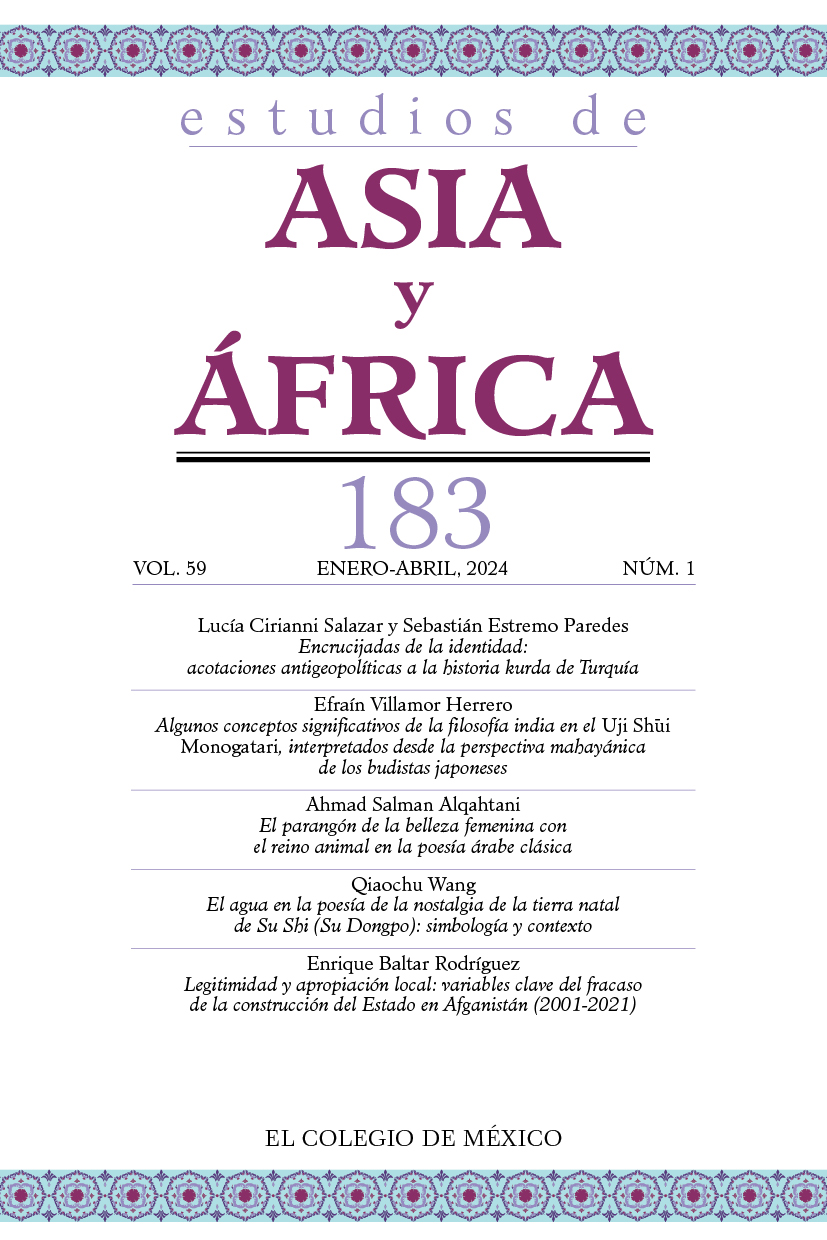Abstract
As a fundamental image of classical Chinese poetry, water assumes a remarkable importance in the work of Su Shi (Su Dongpo). In this paper, we analyze the meanings of this natural element in the compositions of Su Shi related to nostalgia for the hometown—one of the most representative themes in his poetic oeuvre—from the different psychological distances between the author and the image, which could be classified on three: evocation of nostalgia for the hometown, personification and spiritualization. Through translation and analytical observations, we study how the poet assimilates the literary tradition and then innovates with respect to the symbolism of water. The article reveals the influences of the Confucian and Daoist doctrines on the author, contributing to a deeper understanding of his inner world.
References
Bachelard, Gastón. 2003. El agua y los sueños. Ensayo sobre la imaginación de la materia. Traducido por Ida Vitale. México: Fondo de Cultura Económica.
Chen Fuhua 陈复华 et al., eds. 1991. Gudai hanyu cidian 古代汉语词典 [Diccionario de chino clásico]. Beijing: Shangwu yinshua guan.
Chen, Guojian. 2007. Poesía clásica china. Madrid: Cátedra.
Chevalier, Jean, dir., y Alain Gheerbrant. 2012. Diccionario de los símbolos. Barcelona: Herder.
Cirlot, Juan Eduardo. 1988. Diccionario de símbolos. Barcelona: Labor.
Confucio. 1997. Lun Yu. Reflexiones y enseñanzas. Traducido por Anne-Hélène Suárez. Barcelona: Kairós.
Díez, Miguel y María Paz Díez. 2005. Antología comentada de la poesía lírica española. Madrid: Cátedra.
Egan, Ronald C. 1994. Word, Image, and Deed in the Life of Su Shi. Cambridge: Harvard University Press. https://doi.org/10.2307/j.ctt1dnn8pd
Elorduy, Carmelo, tr. 1984. Romancero chino. Madrid: Editora Nacional.
Fuller, Michael A. 1990. The Road to East Slope: The Development of Su Shi’s Poetic Voice. Stanford: Stanford University Press. https://doi.org/10.1515/9781503623200
Gong Wang 龚望. 2011. Tao Yuanming ji pingyi 陶渊明集评议 [Comentarios de la antología de Tao Yuanming]. Tianjin: Nankai daxue chubanshe.
Grant, Beata. 1994. Mount Lu Revisited: Buddhism in the Life and Writings of Su Shih. Honolulu: University of Hawai‘i Press. https://doi.org/10.1515/9780824847081
Guo Muoruo 郭沫若 et al., eds. 1983. Zhongguo shi gao 中国史稿 [Esbozo de la historia de China]. Beijing: Renmin chubanshe.
Hu Xuegang 胡雪冈. 2002. Yixiang fanchou de liubian 意象范畴的流变 [Evolución del significado de yixiang]. Nanchang: Baihuazhou wenyi chubanshe.
Kong Fanli 孔凡礼 y Liu Shangrong, 刘尚荣, eds. 2009. Su Shi shi ci xuan 苏轼诗词选 [Poemas y ci escogidos de Su Shi]. Beijing: Zhonghua shuju.
Leng Chengjin 冷成金 1990. “Zhouchu ziran cong sushi de shanshuishi kan ziran shihua de zouxiang jiqi yiji” 走出自然——从苏轼的山水诗看自然诗化的走向及其意义 [Salir de la naturaleza. La comprensión de la poetización de la naturaleza y su sentido mediante la poesía de paisaje de Su Shi]. Zhongguo renmin daxue xuebao 中国人民大学学报 núm. 4, 94-99.
Liao, Hsien-huei. 2005. “Exploring Weal and Woe: The Song Elite’s Mantic Beliefs and Practices”. T’oung Pao 91 (4/5): 347-395. https://doi.org/10.1163/156853205774910070
Lin, Yutang. 1948. The Gay Genius: The Life and Times of Su Tungpo. Melbourne: Heinemann.
Liu Naichang 刘乃昌 ed. 2005. Su Shi xuan ji 苏轼选集 [Recopilación de obras de Su Shi]. Jinan: Qilu shu she.
LuK, Thomas Yuntong. 1976. A Study of the Nature Poetry of Wang Wei in the Perspective of Comparative Literature. Michigan: University of Michigan.
Min Ze 敏泽. 1983. “Zhongguo gudian yixiang lun” 中国古典意象论 [Sobre el yixiang clásico de China]. En Wenyi yanjiu 文艺研究 [Estudios de literatura y arte], vol. 4, 54-62. Beijing: Wenhua yishu chubanshe.
Peng Dingqiu 彭定求 et al., eds. 1986. Quan tang shi 全唐诗 [Poesía completa de la dinastía Tang]. Shanghái: Shanghai guji chubanshe.
Powers, Martin. 1998. “Love and Marriage in Song China: Tao Yuanming Comes Home”. Ars Orientalis 28, 50-62. http://www.jstor.org/stable/4629530
Sandhaus, Derek. 2019. Drunk in China: Baijiu and the World’s Oldest Drinking Culture. Lincoln: University of Nebraska Press. https://doi.org/10.2307/j.ctvpj7cq5
Su Shi 苏轼. 2000. Su Shi quan ji 苏轼全集 [Antología completa de Su Shi]. Shanghái: Shanghai guji chubanshe.
Su Shi 苏轼. 2016. Su Shi shi ci xuan 苏轼诗词选 [Poemas y ci escogidos de Su Shi]. Editado por Chen Erdong 陈迩冬. Beijing: Renmin wenxue chubanshe.
Tan Xinhong 谭新红 et al., eds. 2015. Su Shi ci quanji 苏轼词全集 [Antología de los ci de Su Shi]. Wuhan: Chongwen shuju.
Tang Guizhang 唐圭璋 et al., eds. 1995. Tang Song ci jianshang cidian 唐宋词鉴赏辞典 [Diccionario de crítica para los ci de las dinastías Tang y Song]. Shanghái: Shanghai cishu chubanshe.
Wang Shuizhao 王水照 y Zhu Gang 朱刚. 2018. Su Shi shi ci wen xuanping 苏轼诗词文选评 [Comentarios de poemas, ci y prosas escogidas de Su Shi]. 8.ª ed. Shanghái: Shanghai guji chubanshe.
Ward, David. 2011. “Playing Host to the Hills: Spatial Dialectics in the Poetry of Su Shi”. Interdisciplinary Studies in Literature and Environment 18 (2): 323-340. https://doi.org/10.1093/isle/isr038
Wilhelm, Richard. 2014. I Ching. El libro de las mutaciones. Traducido por D. J. Vogelmann. Buenos Aires: Sudamericana.
Wills, John E. 1994. Mountain of Fame: Portraits in Chinese History. Princeton: Princeton University Press. https://www.jstor.org/stable/j.ctt7sd8m
Xiao Difei 萧涤非 et al., eds. 1983. Tang shi jianshang cidian 唐诗鉴赏辞典 [Diccionario de críticas para los poemas Tang]. Shanghái: Shanghai cishu chubanshe.
Xu Shen 许慎. 2001. Shuowen jiezi 说文解字 [Comentarios de gráficos y explicaciones de caracteres]. Beijing: Jiuzhou chubanshe.
Yang, Vicent. 1989. Nature and Self: A Study of the Poetry of Su Dongpo, with Comparisons to the Poetry of William Wordsworth. Nueva York: Peter Lang.
Yuan Xingpei 袁行霈. 2002. Zhongguo shige yishu yanjiu 中国诗歌艺术研究 [Estudio del arte de la poesía china]. Beijing: Beijing daxue chubanshe.
Zhuangzi. 2005. Los capítulos interiores de Zhuang Zi. Traducido por Jean Claude Pastor-Ferrer y Pilar González España. Madrid: Trotta.
This work is licensed under a Creative Commons Attribution-NonCommercial-NoDerivatives 4.0 International License
Copyright 2022 Estudios de Asia y África



